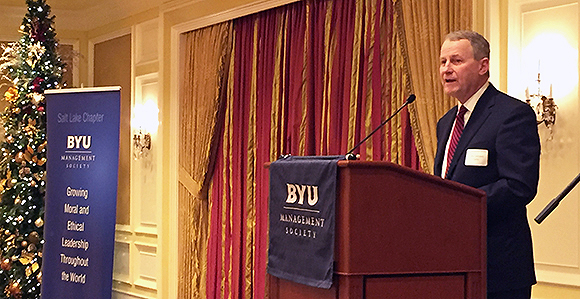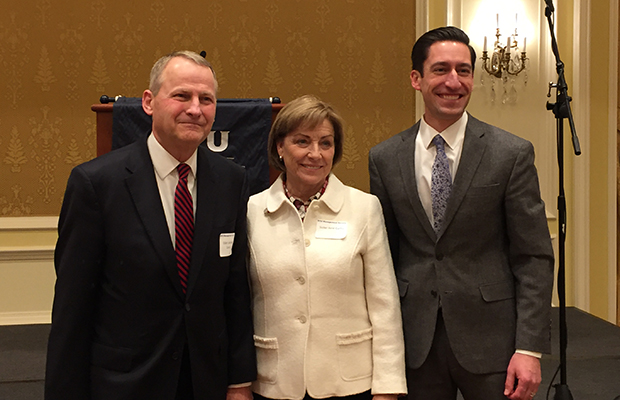Seventy Shares 3 Key Principles to Making “Mankind Your Business”
Contributed By Aubrey Eyre, Church News contributor

Elder LeGrand R. Curtis Jr. speaks at the BYU Management Society devotional on December 11 at the Little America Hotel in Salt Lake City.
Article Highlights
- 1. Make kindness and generosity high priorities.
- 2. Be perfectly honest in all dealings.
- 3. Obey the law and model moral and ethical behavior.
“Because of Christ we can say, ‘I am not the man I was’ and start doing better … and be the kind of man or woman that God wants us to be.” —Elder LeGrand R. Curtis Jr. of the Seventy
Related Links
An object, much like an action, only holds as much worth as one is willing to attribute to it.
In most cases, a teacup is no more than a glass vessel used to hold and distribute liquid. But in the home of Elder LeGrand R. Curtis Jr., a General Authority Seventy, there is a teacup that serves as more. The small cup—once part of a 90-piece china set that belonged to his grandfather but now has now been distributed out to his descendants—is a powerful reminder of the principles his grandfather exemplified.
“It serves as a memory of the heritage that how you deal with people is what really matters at the end of the day,” Elder Curtis said during a devotional on December 11 at the Little America Hotel in Salt Lake City.
The set of fine china was given to Elder Curtis’s grandfather many years ago when, after making a deal for a land lease in the Sugarhouse area of Salt Lake City, his grandfather allowed the man with whom he made the deal to be released from his contract once he realized the land would not properly serve the purpose for which he had purchased it.
The 90-piece china set was given to his grandfather as a gift from the man as a sign of respect and gratitude for his consideration.
Speaking to a large crowd at the BYU Management Society Annual Christmas Devotional, Elder Curtis shared stories of his grandfather’s and father’s examples, as well as details from the story A Christmas Carol, which demonstrate the importance of keeping ethical and moral standards in business, both personal and professional.
“Our goal as a society is to improve moral and ethical leadership around the world,” said Dave Austin, the BYU Management Society Salt Lake chapter vice president. “We feel like that’s a huge need we have in our society … with the way things are now and with everything you see in the news with different companies. Having companies and individuals that are moral and ethical is of the utmost importance for us, … so that is our entire focus with everything we do.”
Speaking to those same themes, Elder Curtis shared the words of Charles Dickens’s A Christmas Carol character Jacob Marley when he said, “Mankind was my business. The common welfare was my business. Charity, mercy, forbearance, and benevolence were all my business,” while visiting his old business partner Ebenezer Scrooge in a ghostly form.
“So the question is, what is your business?” Elder Curtis asked. “Is it just what you happen to do for a living, or how you manage money, or what you do in the commercial world? Or do you buy into the notion that Jacob Marley had, that mankind was my business, the common welfare was my business? … And how do we go about making the common welfare—charity, forbearance, and benevolence—your business and our business?”
Each individual has a responsibility to care for people, for one another in their communities and families and in their professional pursuits, said Elder Curtis, and he shared three key principles for how to better make “mankind your business.”
Kindness and generosity
Sharing the example of Scrooge’s response after being shown Mr. Fezziwig, his old boss, by the Ghost of Christmas Past, Elder Curtis explained the power and effect that each individual can have on one another.
After watching Mr. Fezziwig host a party for his employees, the ghost says to Scrooge, “A small matter … to make these silly folks so full of gratitude.”
But Scrooge, momentarily upset by the notion that his old friend Fezziwig’s kindness doesn’t matter, responds, “He has the power to render us happy or unhappy, to make our service light or burdensome, a pleasure or a toil. Say it is that his power lies in words and looks, in things so slight and insignificant that it is impossible to add and count them up. What then? The happiness he gives is quite as great as if it cost a fortune.”
Too often people underestimate their ability to make those around them happy and to make their lives and work a pleasure rather than a burden, Elder Curtis said.

Left to right: Elder LeGrand R. Curtis Jr., Sister Jane Curtis, and Matthew Sadowski, chapter president, after the BYU Management Society devotional at the Little America Hotel on December 11 in Salt Lake. Photo by Aubrey Eyre.
Perfect honesty
Elder Curtis recalled reading a story in the New Era magazine years ago that described how a man was accidentally given a bag of cash rather than a bag of medications due to the mistake of an employee at a pharmacy.
He described how the employee who made the mistake was shown mercy and kindness from her boss after being honest with him about the mistake. And rather than keeping the large sum of money, the man who had wrongly received the money returned the bag to the company.
Both people serve as examples of how an individual’s choice to be both kind and honest can benefit others around them, Elder Curtis said, adding that he particularly likes the story because it was his father who had mistakenly received and returned the money.

Quinn Dietlein, executive director for Hale Center Theater Sandy, performed “Silent Night” at the BYU Management Society devotional on December 11, prior to Elder LeGrand R. Curtis Jr.’s address. Photo by Aubrey Eyre.
Obedience to the law
“We believe in honoring and sustaining the law,” said Elder Curtis, citing the twelfth article of faith. And whether those laws are the laws of the land or the laws of God, honoring them serves to benefit mankind and help continue to build a moral and ethical world for all, he explained, sharing various examples of how the Church strives to remain obedient to the laws of the land and of moral and ethical standards, particularly in areas where corruption is prevalent.
“It is always essential that we model moral and ethical behavior even where corruption is normal,” he said.
The chance to be better
“I am not the man I was,” Dickens’s Scrooge says in the morning after being visited by the spirits. Elder Curtis said that phrase is one he often uses when he repents or realizes a need to change as well.
“A Christmas Carol is a wonderful Christmas story, but it is not the Christmas story,” he continued. “The Christmas story is the coming of the Savior to save us from our sins, the coming of the Son of God who makes it so we can repent and try to be better than we are.”
Christmas is a reminder that each person can be more than they feel they are, Elder Curtis concluded. “Because of Christ we can say, ‘I am not the man I was’ and start doing better … and be the kind of man or woman that God wants us to be.”

Elder LeGrand R. Curtis Jr. speaks at a devotional for the BYU Management Society at the Little America Hotel on December 11. Photo by Aubrey Eyre.
